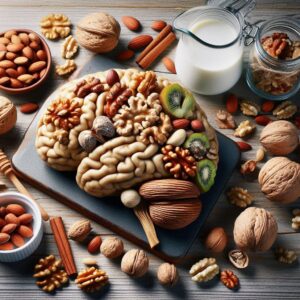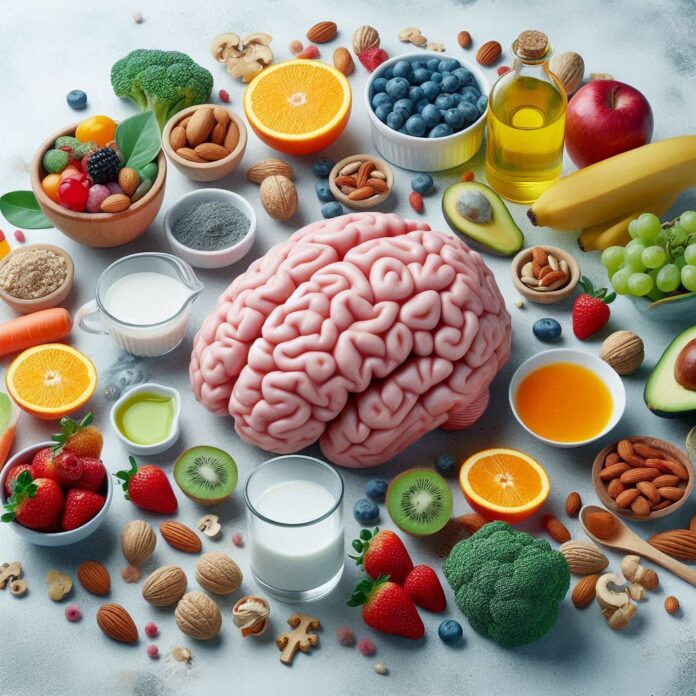Enhancing memory and cognitive health through diet is an area of growing interest and research. Certain foods have been scientifically proven to provide essential nutrients that support brain function, protect against cognitive decline, and enhance memory. This guide delves into the specific benefits of fatty fish, red fruits and berries, nuts and seeds, green vegetables, coffee and green tea, vegetable oils, legumes, and whole grains. By incorporating these nutrient-rich foods into your daily diet, you can optimize brain health and improve cognitive performance, ensuring better memory retention and overall mental acuity.
I. Fatty Fish: Boosting Memory Through Omega-3 Fatty Acids.

Fatty fish are widely recognized for their numerous health benefits, particularly for their crucial role in maintaining and enhancing memory. Fish such as salmon, mackerel, herring, trout, and sardines are rich in omega-3 fatty acids, which are essential for proper brain function.
1. Omega-3 Fatty Acids and the Brain:
The human brain is composed of approximately 60% fat, a significant portion of which consists of omega-3 fatty acids, primarily docosahexaenoic acid (DHA). DHA is fundamental for the development and maintenance of brain function throughout life. It promotes the fluidity of neuronal membranes, facilitating communication between brain cells. A deficiency in DHA can lead to cognitive problems, including memory issues and decreased learning capabilities.
2. Improved Blood Circulation:
Omega-3 fatty acids found in fatty fish also play a crucial role in cardiovascular health, which in turn affects brain health. Proper blood circulation is essential for delivering oxygen and nutrients to the brain. Omega-3s help reduce inflammation, prevent plaque formation in arteries, and improve the flexibility of blood vessels, which can reduce the risk of strokes and heart diseases that could impair cognitive functions.
3. Reduction of Triglycerides:
High triglyceride levels are associated with an increased risk of cardiovascular diseases, which can lead to cognitive and memory issues. Omega-3s in fatty fish help lower triglyceride levels in the blood, thereby reducing the risk of vascular brain damage. Regular consumption of fatty fish can therefore play a significant preventive role against age-related cognitive decline, including dementia and Alzheimer’s disease.
4. Prevention of Cognitive Decline:
Several studies have shown that people who regularly consume fatty fish have a reduced risk of cognitive decline and dementia. Omega-3s protect neurons from damage and inflammation, thereby delaying the progression of cognitive disorders. Additionally, the vitamins and minerals present in fish, such as selenium and vitamin D, also contribute to brain health by supporting proper neural function and protecting cells from oxidative damage.
5. Enhancing Memory Through Fatty Fish:
Fatty fish are a valuable source of essential nutrients for the brain, particularly omega-3 fatty acids, which play a central role in maintaining memory and cognitive functions. By regularly incorporating fatty fish into your diet, you can not only improve your current mental health but also prevent memory disorders and neurodegenerative diseases in the long term.
II. Red Fruits and Berries: Impact on Memory.

Red fruits and berries, including strawberries, blueberries, raspberries, and blackberries, are not only delicious but also packed with nutrients that can boost memory and overall brain health. These fruits are rich in antioxidants, vitamins, and other compounds that play significant roles in cognitive function.
1. Antioxidants and Brain Health:
One of the primary reasons red fruits and berries are beneficial for memory is their high antioxidant content, particularly flavonoids like anthocyanins. Antioxidants help combat oxidative stress, which can damage brain cells over time. This protection helps maintain healthy brain function and slows down cognitive decline. Studies have shown that the antioxidants in berries can reduce inflammation and protect against age-related cognitive disorders.
2. Improved Communication Between Brain Cells:
Berries have been found to enhance communication between brain cells. Compounds in berries, such as flavonoids, can improve synaptic plasticity, which is crucial for learning and memory. By promoting the growth and communication of neurons, these compounds help keep the brain agile and responsive.
3. Delayed Cognitive Decline:
Regular consumption of berries has been associated with a slower rate of cognitive decline. Research involving large groups of elderly individuals has demonstrated that those who consume berries regularly experience less memory decline compared to those who do not. For instance, a study from Harvard found that women who consumed two or more servings of strawberries and blueberries per week had delayed memory decline by up to two and a half years.
4. Enhanced Memory and Learning:
The compounds in berries not only protect the brain from damage but also actively enhance cognitive functions. Laboratory studies have shown that diets enriched with berries improve memory performance and cognitive abilities in animals. These improvements are linked to increased production of new neurons in the hippocampus, a brain area crucial for memory and learning.
5. Boosting Memory with Red Fruits and Berries:
Incorporating red fruits and berries into your diet can have significant benefits for memory and overall brain health. Their high antioxidant content, ability to enhance neuron communication, and potential to delay cognitive decline make them a valuable addition to a brain-healthy diet. By regularly consuming these fruits, you can support your cognitive functions and protect against memory-related disorders as you age.
III. Cognitive Benefits of Nuts and Seeds:

Nuts and seeds are powerhouse foods that significantly benefit brain health, particularly in enhancing memory. Rich in essential nutrients such as healthy fats, proteins, vitamins, and minerals, nuts and seeds play a crucial role in maintaining and boosting cognitive functions.
1. Omega Fatty Acids and Brain Health:
Nuts and seeds are excellent sources of omega-3 and omega-6 fatty acids, which are vital for brain health. These essential fats are not produced by the body and must be obtained through diet. Omega-3s, particularly alpha-linolenic acid (ALA) found in walnuts, help maintain the structure of brain cell membranes, support neuron communication and promote the growth of synapses, which are critical for memory and learning.
2. Antioxidants and Cognitive Function:
The high antioxidant content in nuts and seeds, such as vitamin E, helps protect the brain from oxidative stress caused by free radicals. This protection reduces inflammation and prevents cell damage, which can otherwise lead to cognitive decline. For example, almonds are rich in vitamin E and phenylalanine, an amino acid that enhances the production of neurotransmitters like dopamine, which are crucial for mood regulation and memory.
3. Enhanced Blood Circulation and Vascular Wellness:
Regular consumption of nuts has been linked to improved blood flow to the brain. Studies have shown that daily intake of mixed nuts can enhance vascular function, reduce arterial stiffness, and improve blood flow in critical areas of the brain associated with memory and cognitive functions. Improved blood flow ensures that the brain receives adequate oxygen and nutrients, which is essential for maintaining optimal brain health.
4. Neuroprotective Properties:
Nuts and seeds contain various neuroprotective compounds that support brain health. For instance, walnuts are known for their high levels of DHA, a type of omega-3 fatty acid that is crucial for brain health. DHA helps reduce neuroinflammation and oxidative stress, thereby protecting against age-related cognitive decline. Similarly, pumpkin seeds are rich in zinc, which plays a significant role in memory and cognitive stability.
5. Enhancing Memory Through Nuts and Seeds:
Incorporating nuts and seeds into your daily diet can have profound benefits for memory and overall brain health. Their rich content of omega fatty acids, antioxidants, and essential nutrients helps protect the brain, improve blood flow, and enhance cognitive functions. By consuming a variety of nuts and seeds regularly, you can support your cognitive health and protect against memory decline as you age.
IV. Boosting Memory and Cognitive Function with Green Vegetable:

Green vegetables, including leafy greens like spinach, kale, and collard greens, are known for their numerous health benefits. Notably, these vegetables play a significant role in boosting memory and overall cognitive function. Rich in essential nutrients, green vegetables contribute to brain health in various ways.
1. Antioxidants and Cognitive Health:
Green vegetables are packed with antioxidants, such as vitamin C and vitamin E, which help protect the brain from oxidative stress. Oxidative stress can damage brain cells over time, leading to cognitive decline. The antioxidants in green vegetables neutralize free radicals, thus preserving brain function and improving memory. For example, spinach and kale are particularly high in these protective antioxidants, helping to keep the brain healthy and resilient.
2. Essential Vitamins and Minerals:
Leafy greens are rich in essential vitamins and minerals that support brain health. Vitamin K found abundantly in greens like kale and spinach, is crucial for brain health as it aids in the formation of sphingolipids, which are vital for the structure and function of brain cells. Additionally, folate (vitamin B9) present in green vegetables helps in reducing homocysteine levels in the blood, which is associated with a lower risk of cognitive decline and memory loss.
3. Improved Blood Flow:
Green vegetables, particularly those high in nitrates such as beet greens and spinach, help improve blood flow to the brain. Nitrates are converted into nitric oxide in the body, which dilates blood vessels and enhances blood circulation. Improved blood flow ensures that the brain receives adequate oxygen and nutrients, which are essential for maintaining cognitive functions and memory.
4. Neuroprotective Properties:
The neuroprotective properties of green vegetables are attributed to the various bioactive compounds they contain. For instance, lutein and beta-carotene, found in high amounts in vegetables like kale and spinach, have been linked to better cognitive performance and slower cognitive decline. These compounds help protect neurons and support the growth of new brain cells, which are critical for memory and learning.
5. Enhancing Memory Through Green Vegetables:
Incorporating green vegetables into your diet can significantly enhance memory and overall brain health. Their rich content of antioxidants, essential vitamins, and bioactive compounds helps protect the brain, improve blood flow, and support cognitive functions. By consuming a variety of green vegetables regularly, you can maintain and improve your cognitive health and protect against memory decline as you age.
V. Enhancing Memory and Brain Health with Coffee and Green Tea:

Both coffee and green tea are not just popular beverages, but also powerful enhancers of cognitive function and memory. This section delves into the scientific reasons why these drinks are beneficial for memory and brain health.
1. Caffeine and Memory Enhancement:
Caffeine, a major component of both coffee and green tea, plays a significant role in boosting memory. Studies have shown that caffeine improves memory retention and recall by stimulating the central nervous system. It enhances the brain’s ability to recognize and separate similar items, a process known as pattern separation, which is crucial for detailed memory recall. Additionally, caffeine increases the production of neurotransmitters like dopamine and norepinephrine, which are essential for mood regulation and cognitive performance.
2. Antioxidants and Neuroprotection:
Green tea contains high levels of antioxidants, particularly catechins, and flavonoids, which have strong neuroprotective effects. These compounds help reduce oxidative stress and inflammation in the brain, protecting neurons from damage. Regular consumption of green tea has been linked to improved working memory and overall cognitive function. The antioxidants in green tea also enhance blood flow to the brain, ensuring it receives sufficient oxygen and nutrients.
3. Long-Term Cognitive Benefits:
Both coffee and green tea have been associated with long-term cognitive benefits. Regular consumption of these beverages can lower the risk of cognitive decline and neurodegenerative diseases such as Alzheimer’s. For instance, a study found that older adults who drank tea daily had a significantly lower risk of developing cognitive impairments. Similarly, long-term coffee consumption has been linked to a reduced risk of dementia and Alzheimer’s disease due to its protective effects on brain health.
4. Enhancing Mood and Mental Alertness:
The combination of caffeine and other bioactive compounds in coffee and green tea can also enhance mood and mental alertness. Green tea contains L-theanine, an amino acid that works synergistically with caffeine to improve focus and calmness without the jitters often associated with coffee. This combination not only boosts cognitive performance but also helps maintain a balanced mood and reduces anxiety.
5. Boosting Memory with Coffee and Green Tea:
Incorporating coffee and green tea into your daily routine can provide substantial benefits for memory and overall brain health. The caffeine in these beverages enhances memory retention and recall, while the antioxidants in green tea offer strong neuroprotective effects. Regular consumption of coffee and green tea can also lower the risk of cognitive decline and neurodegenerative diseases. By enjoying these beverages regularly, you can support your cognitive functions and protect against memory loss as you age.
VI. Boosting Memory and Cognitive Health with Vegetable Oils:

Vegetable oils, particularly extra-virgin olive oil, have been shown to significantly enhance memory and overall brain health. Rich in healthy fats and antioxidants, these oils play a crucial role in supporting cognitive functions and protecting against cognitive decline.
1. Monounsaturated Fats and Brain Health:
Vegetable oils like olive oil are rich in monounsaturated fats, which are known to support brain health. These fats help reduce inflammation and improve the structure and function of cell membranes in the brain. Monounsaturated fats also contribute to the production of acetylcholine, a neurotransmitter essential for memory and learning. Studies have shown that diets high in monounsaturated fats are associated with better cognitive performance and a lower risk of memory-related diseases.
2. Antioxidants and Neuroprotection:
Olive oil, in particular, is rich in antioxidants such as polyphenols and vitamin E. These antioxidants help protect the brain from oxidative stress and free radical damage, which are major contributors to cognitive decline and neurodegenerative diseases like Alzheimer’s. The antioxidants in olive oil can cross the blood-brain barrier, providing direct neuroprotective effects that support memory retention and cognitive functions.
3. Enhanced Blood Circulation and Vascular Health:
Regular consumption of vegetable oils, especially olive oil, improves cardiovascular health, which in turn supports brain health. Healthy blood vessels are essential for delivering oxygen and nutrients to the brain. Olive oil has been shown to improve endothelial function, reduce arterial stiffness, and enhance overall blood flow. This improved circulation helps maintain cognitive functions and prevent memory impairment.
4. Anti-Inflammatory Properties:
The anti-inflammatory properties of vegetable oils, particularly those high in omega-3 and omega-6 fatty acids, help reduce brain inflammation. Chronic inflammation in the brain can lead to cognitive decline and memory problems. By incorporating oils like olive oil and canola oil into your diet, you can help reduce inflammation and support a healthy brain environment conducive to learning and memory retention.
5. Enhancing Memory with Vegetable Oils:
Incorporating vegetable oils into your daily diet can provide substantial benefits for memory and overall brain health. The healthy fats and antioxidants found in these oils help protect the brain, improve blood flow, and reduce inflammation, all of which are essential for maintaining and enhancing cognitive functions. By using oils like olive oil regularly, you can support your cognitive health and protect against memory decline as you age.
VII. Legumes and Whole Grains: Boosting Memory Through Nutrition.

Legumes and whole grains are essential components of a brain-healthy diet. These foods are packed with nutrients that support cognitive functions and enhance memory. Incorporating legumes and whole grains into your diet can provide substantial benefits for brain health, helping to maintain and boost memory.
1. Complex Carbohydrates and Steady Glucose Supply:
Legumes and whole grains are excellent sources of complex carbohydrates, which provide a steady supply of glucose to the brain. Unlike refined carbohydrates that cause quick spikes in blood sugar, complex carbs are digested slowly, ensuring a consistent energy supply to the brain. This steady glucose level is crucial for optimal cognitive function and memory retention.
2. Rich in Folate and B Vitamins:
Both legumes and whole grains are rich in folate (vitamin B9) and other B vitamins, which are vital for brain health. Folate helps reduce homocysteine levels, an amino acid linked to cognitive decline and memory loss. B vitamins are also essential for producing neurotransmitters that regulate mood and cognitive functions.
3. Antioxidant Properties:
Legumes and whole grains contain antioxidants that protect brain cells from oxidative stress and inflammation. For instance, whole grains like quinoa and brown rice are rich in vitamins E and B, which have neuroprotective properties. These antioxidants help reduce the risk of neurodegenerative diseases and support overall brain health.
4. Boosting Circulation and Cardiovascular Function:
Regular consumption of whole grains and legumes can improve cardiovascular health, which is directly linked to brain health. Improved blood flow ensures that the brain receives adequate oxygen and nutrients necessary for maintaining cognitive functions. Foods like oats and barley are particularly effective in promoting heart health and, consequently, brain health.
5. Neuroprotective Nutrients:
Legumes such as lentils and chickpeas are high in magnesium, zinc, and choline, which are essential for brain function. Magnesium helps with nerve transmission and neuroplasticity, zinc is crucial for memory formation, and choline is important for the production of acetylcholine, a neurotransmitter involved in memory and learning.
6. Enhancing Memory Through Legumes and Whole Grains:
Incorporating a variety of legumes and whole grains into your diet can significantly enhance memory and cognitive health. Their rich content of complex carbohydrates, B vitamins, antioxidants, and neuroprotective nutrients supports brain function and helps protect against cognitive decline. By regularly consuming foods like quinoa, brown rice, oats, lentils, and chickpeas, you can maintain and improve your cognitive health and memory as you age.
Conclusion:
Adopting a diet rich in memory-boosting foods is a proactive way to support brain health and cognitive function. The omega-3 fatty acids in fatty fish, antioxidants in berries and green vegetables, healthy fats in nuts and vegetable oils, and the steady glucose supply from legumes and whole grains all contribute to a robust cognitive system. Regular consumption of these foods can help maintain sharp memory, reduce the risk of cognitive decline, and protect against neurodegenerative diseases. By making these foods a staple in your diet, you can promote long-term brain health and enhance your quality of life.

